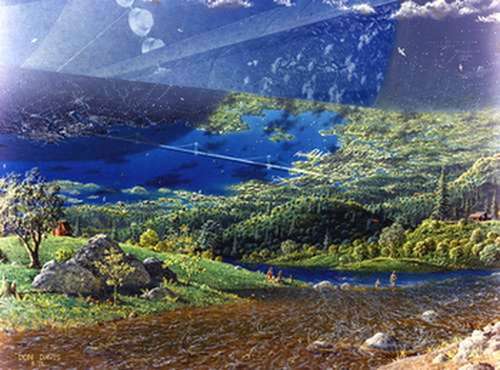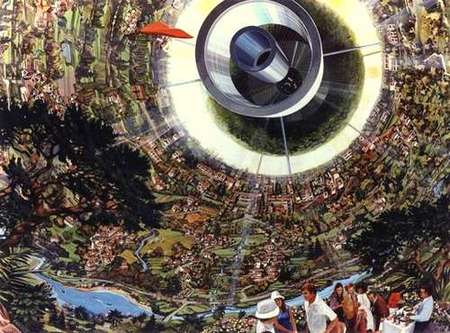
Space and Human Survival
My Views on the Importance of Colonizing Space
by Sylvia Engdahl
This is a statement that I originally wrote in 1994 for the students in my online Connected Education course on Space Age Mythology (I've since made a few minor modifications.) It wasn't part of the course material, but simply explains personal views I have often referred to in online discussions. It also will shed light on why all my novels are about space travel and/or other worlds.At the time I wrote this, I believed that orbiting colonies of the kind proposed by physicist Gerard O'Neill were the most practical first step in establishing a major human presence in space and that they could be built soon if enough effort and funding were devoted to it. We now know that they are a long way ahead and are not the top priority. That does not invalidate the basic facts about the need to make use of extraterrestrial materials and energy and to move polluting industry into orbit in order to preserve Earth's environment. I still think there will be orbiting colonies someday, but other things, such as a permanent base on the moon and/or Mars, and perhaps the mining of asteroids, will precede them.
*
People have frequently asked me why I believe expansion into space is essential to human survival. Here's why.
Space and Human Survival, Part I
Until recently, the reason most commonly offered for believing our survival depends on space travel was that our species will need to move elsewhere in order to survive the ultimate death of our sun, or the possibility of our sun turning into a nova. (Scientists now believe that these specific scenarios won't happen; but the sun will eventually become a red giant, which as far as Earth is concerned, is an equally disastrous one.) This is not of such remote concern as it may seem, as I'll explain below. However, it surely is a remote event, billions of years in the future, and I don't blame anyone for not giving it very high priority at present. It is far from being my main reason.A more urgent cause for concern is the need not to "put all our eggs in one basket," in case the worst happens and we blow up our own planet, or make it uninhabitable by means of nuclear disaster or perhaps biological warfare. We would all like to believe this won't happen, yet some people are seriously afraid that it will--it's hardly an irrational fear. Peace with Russia may have drawn attention from it, yet there are other potential troublemakers, even terrorists; the nuclear peril is not mere history. Furthermore, there is the small but all-too-real possibility that Earth might be struck by an asteroid. We all hope and believe our homes won't burn down, and yet we buy fire insurance. Does not our species as a whole need an insurance policy?

Sooner or later,an asteroid might approach Earth, and we would need space technology to detect ir and prevent it from striking.
Even Carl Sagan, a long-time opponent of using manned spacecraft where robots can serve, came out in support of space colonization near the end of his life, for this reason; see his book Pale Blue Dot. And in an interview with Britain's newspaper Daily Telegraph, eminent cosmologist Stephen Hawking said, "I don't think that the human race will survive the next thousand years unless we spread into space. There are too many accidents that can befall life on a single planet." Hawking is more worried about the possibility of our creating a virus that destroys us than about nuclear disaster. However, he said, "I'm an optimist. We will reach out to the stars."
My novel The Far Side of Evil (Atheneum, 1971; updated version Walker, 2003) is based on the concept of a "Critical Stage" during which a species has the technology to expand into space, but hasn't yet implemented it, and in which that same level of technology enables it to wipe itself out. The premise of the book is that each world will do one or the other, but not both. I have believed this since the early 50s, when there was real danger of nuclear war but no sign of space travel. When the Russians launched Sputnik in 1957, my reaction was overwhelming joy and relief, because I thought that at last our energies were going to be turned toward space exploration. I felt that way through the era of Apollo. Since Apollo, as public support of the space program has waned, my fears have grown again, because I don't believe that a world turned in on itself can remain peaceful. A progressive species like ours has a built-in drive to move forward, and that energy has to go somewhere. Historically, when it was not going into mere survival or into the exploration and settlement of new lands--which is the adaptive reason for such a drive--it has gone into war.
This is the price we pay for our innate progressiveness. I know that it is now fashionable to deride the concept of progress, and certainly we cannot say that progress is inevitable. It surely doesn't characterize all change in all areas of human endeavor. Nevertheless, overall, the human race as awhole advances; if it did not we would still be cavemen. This is what distinguishes our species from all others. And like it or not, this drive is inseparable from the drive toward growth and expansion. Many successful species colonize new ecological niches; this is one of the fundamental features of evolution. When a species can't find a new niche, and the resources of the old one are no longer sufficient, it dies out. If the resources do remain sufficient, it lives, but is unchanging from era to era. There are no cases in biology of progressive evolution unaccompanied by expansion.
The question of resources raises an even more crucial reason for expansion into space than the danger of Earth's destruction. It's obvious that this planet cannot support an expanding population forever. Most people who recognize this fact advocate population control to the extent of "zero population growth." I do not; I believe it would be fatal not only for the reason explained above, but because if it could be achieved it would result in stagnation. I do not want a world in which there can be no growth; growth leads to intellectual and artistic progress as well as to material survival. Furthermore, I do not believe it could be achieved. The built-in desire for personal descendants is too strong; that is why our species has survived this long, why it has spread throughout the entire world. Moreover, the biological response to threatened survival is to speed up reproduction, as we can see by the number of starving children in the world. If we tried to suppress population growth completely, we would have either immediate violent upheaval or a period of dictatorship followed by bloody revolution. Ultimately, we would reduce the population all right; we would decimate it. That may be "survival" but it's surely not the future we want.

Millions of children are starving in lands with too few resources and too little technology to use those they have. Without resources from space it will be like that everywhere when world population grows.
Myths showing these things are indeed part of the response to a new perception of our environment: the perception that as far as Earth is concerned, it is limited. [A basic premise of my course was that all myth is a response of a culture to the environment in which it perceives itself to exist.] But at the rational level, people do not want to face them. They tell themselves that if we do our best to conserve resources and give up a lot of the modern conveniences that enable us to spend time expanding our minds, we can avoid such a fate--as indeed we can, for a while. But not forever. And most significantly, not for long enough to establish space settlements, if we don't start soon enough. Space humanization is not something that can be achieved overnight.
I have called this stage in our evolution the "Critical Stage." Paul Levinson [the Director of Connected Education] uses different terminology for the same concept. He says that we have only a narrow window to get into space, a relatively short time during which we have the capability, but have not yet run out of the resources to do it. I agree with him completely about this. Expansion into space demands high technology and full utilization of our world's material resources (although not destructive utilization). It also demands financial resources that we will not have if we deplete the material resources of Earth. And it demands human resources, which we will lose if we are reduced to global war or widespread starvation. Finally, it demands spiritual resources, which we are not likely to retain under the sort of dictatorship that would be necessary to maintain a "sustainable" global civilization.
Because the window is narrow, then, we not only have to worry about immediate perils. The ultimate, unavoidable danger for our planet, the transformation of our sun, is distant--but if we don't expand into space now, we can never do it. Even if I'm wrong and we survive stagnation, it will be too late to escape from this solar system, much less to explore for the sake of exploring.

We could obtain enough solar power from space to serve the needs of the whole world, and we could get raw materials from the moon and asteroids to make up for the increaing shortage of resouces on Earth.
One big reason why they should not is the "narrow window" concept. The other is that they could not. I have explained why I believe the problem of war can't be solved without expansion. The problem of hunger is, or ultimately will be, the direct result of our planet's limited resources; though it could be solved for the near-term by political reforms, we are not likely to see such reforms while nations are playing a " zero-sum game" with what resources Earth still has. Widespread poverty, when not politically based, is caused by insufficient access to high technology and by the fact that there aren't enough resources to go around (if you doubt this, compare the amount of poverty here with the amount in the Third World, and the amount on the Western frontier with the amount in our modern cities). Non-contagious disease, such as cancer, is at least partially the result of stress; and while expansion won't eliminate stress, overcrowding certainly increases it. The problem of atmospheric pollution is the result of trying to contain the industry necessary to maintain our technology within the biosphere instead of moving it into orbit where it belongs.
What about the growing problem of international terrorism? Unfortunately, it is exactly what can be expected in a Critical Stage civilization: one that has outgrown its home world but has not yet directed its energies into moving beyond, and in which the evil actions of a few individuals can affect the entire planet. In one way this is a hopeful view; it reflects my belief that the threats we face are not signs of something having gone wrong with us, but unavoidable ones with which we must deal. But time is running out. To let the fight against terrorism distract us from developing space technology would, in my opinion, be self-defeating.
In short, all the worldwide problems we want to solve, and feel we should have solved, are related to the fact that we've outgrown the ecological niche we presently occupy. I view them not as pathologies, but as natural indicators of our evolutionary stage. I would like to believe that they'll prove spurs to expansion. If they don't, we'll be one of evolution's failures.
If I have frightened any readers here, I'm not sorry! But cheer up; in Part II I'll explain how humanizing space can not only save our species, but give all cultures equal access to resources that are virtually unlimited.
Colonies or Settlements?
People sometimes object to the term "space colonies" on political grounds and for this reason NASA, along with some others, prefers the term "space settlements." The objection, however, strikes me as invalid. To be sure, "colonization" does have some bad associations, since on Earth it always involved taking over the land and/or culture of indigenous inhabitants--but that is precisely what a space colony would not do! Nobody, to the best of my knowledge, advocates colonizing inhabited planets, even if we should ever find any. The idea of expanding into space is to abandon our dependence on zero-sum games. A more accurate precedent for the term "colonize" in the space context is its meaning in biology: the establishment of a species' presence in a new ecological niche. I'm therefore glad to see "space colonies" prevailing on the Web.
Space and Human Survival, Part II
When we think of space exploration, we usually think of its goal as "To seek out new life and new civilizations, to go where no [hu]man has gone before." That's what excites us and inspires awe, in some of us at least, and that's certainly the fountainhead of our mythology. Personally, I believe that from the evolutionary standpoint the joy of exploration is a built-in factor for preservation of the species, just as is the joy of sexual love. But, as our feelings about sexual love mean much more to us than biology and have been the source of many great achievements of our civilization, our exploratory instinct means more than survival. The discovery of new lands has always led to a renaissance in the arts and in intellectual progress, and the same will be true of expansion into space. This process is an aspect of our creativity. We do not explore because we want to survive, any more than we make love because we want to survive; survival is only a byproduct.However, at this stage of our evolution we have run into a problem with the process [see postscript below]. Columbus explored because of his personal urge to do so, and both the Renaissance and human survival followed. (Explorers of some sort were essential to survival--imagine what would have happened if our species had been forever confined to the single site where it diverged from its hominid ancestors.) It was difficult for explorers to get money for ships, but each had to talk only one backer into it; Columbus, according to legend, convinced Queen Isabella. Settlers could move into new lands with their personal resources alone, as Americans did when they loaded their belongings into wagons and set out on the Oregon Trail. Both explorers and settlers were laughed at by people who didn't share their views; it didn't matter. They went anyway. It wasn't necessary for their culture as a whole to decide that it wasn't a waste of money.
Not so with space humanization. We can't rely on the drive toward exploration because, by the population at large, it's not considered a top priority. It never was, in any society. If the people of Columbus' time had had to vote to tax themselves in order to fund his ships, he wouldn't have gotten anywhere; most of them felt he would fall off the edge of the world, and even the educated minority, who knew better, felt there was better use for their money. Even in that era, the most altruistic would no doubt have preferred to give Isabella's jewels to the poor. There were some myths, travelers' tales, about riches to be found in new lands; but just as in our time, rational, hardheaded skepticism ruled the majority.

The inside of an orbiting O'Neill colony (Courtesy of NASA Ames Research Center)
It is true enough that we can't solve the problems of Earth by setting forth in starships like the Enterprise, or by interplanetary travel at all. From an economic standpoint, a trip to Mars is not the best way to begin the process of expansion (though it's certainly a later goal, and I support doing it first on the grounds of its effect on the public imagination--see What About Mars). The basic ideas of space humanization are (a) to make use of extraterrestrial resources to supplement those of Earth; (b) to move heavy industry off Earth, where it pollutes and where energy is expensive, into orbit, where energy is cheap; and (c) to provide large areas of living space to which people can eventually move (not to "ship extra people into space," which as critics are quick to point out, would not work, but to make room for new people to be born without increasing Earth's population). Only in this way can we get the resources we need both for preserving Earth's biosphere and for eventually building starships.
If you have not heard of this scenario before, it's likely to strike you as impossible, impractical, or prohibitively expensive, if not all three. It certainly isn't what mythology has thus far prepared us for. And yet, we had the technological capability to begin this process 30 years ago, and it's not nearly as costly as the exploration of a planet without prior space industrialization. The key to it is that we wouldn't try to lift the components of space habitats up from Earth. We would use raw materials from the moon and asteroids, and build solar power satellites in orbit. The power would then be beamed to Earth, where it would be cheap enough to lift the Third World out of poverty (many people in the Third World spend a large share of their time and/or income on firewood, and in so doing, destroy forests). Products of space-based industries would be shipped down to Earth, not lifted up out of its "gravity well". Some scientists feel that enough food could be raised in orbit to ship food down, as well. And meanwhile, the space-dwellers producing all these things cheaply for Earth would be getting rich, because they would not be citizens of Earth nations; they would be citizens of their own orbiting colonies, entitled to the full proceeds of their labor. Eventually, they would be rich enough to fund interstellar expeditions. And their living conditions would not be what you're imagining if you're picturing Deep Space Nine. Orbiting colonies--probably the most difficult concept to understand if you haven't seen any of the artists' renditions--would be little worlds built from extraterrestrial materials, with the living space on the inside of the sphere. They would be complete biospheres with trees and lakes and gardens, much less crowded and less sterile than New York City. Many of their advocates have said that having once lived that way, humans would never want to live on the surface of a planet again, and that if they traveled to a new planet, they'd go to its surface only to explore.

The inside of an orbiting O'Neill colony (Courtesy of NASA Ames Research Center)
Most space experts don't advocate anything as ambitious as O'Neill Colonies. It's not likely that space industrialization will proceed that rapidly. But we could do it in stages. We could build the solar power satellites (studies that have "proven" them impractical have been based on the assumption that materials would be lifted from Earth; use of lunar materials would make them cost-effective). And we could certainly start utilizing the too-long-abandoned moon. But the American people seem blind to the need to do so, and while private corporations could ultimately get rich by doing it, it's a very long-term investment. So I get very discouraged, and fearful that our "window" (see Part I) will close.
Of course, I too am excited by the long-range possibilities of galactic exploration shown in Space Age mythology. Paul Levinson has a lot to say about the infinity of the universe and how, in principle, our species has access to its infinite resources and the infinite extension of intelligence this will make possible. I agree wholeheartedly (except that unlike him, I believe we will meet other intelligent species someday). But none of this can happen unless we survive long enough to make it happen. And we can't survive that long, in my opinion, unless we take the necessary steps to get from here to there. This is why I believe the most crucial function of our new mythology, and the one with the greatest adaptive value, is expression of the idea that people belong in space.
POSTSCRIPT, 2019:
While I still strongly believe most of I said in this essay, I now feel that it is neither possible nor necessary to convince the public. The majority is not emotionally ready to face the idea of an environment larger than our home planet, and the advances will be made by the minority with exceptional vision, as they always have been throughout human history. When I stated above that "at this stage of our evolution we have run into a problem with the
process," implying that our situation is different from the past when exploration didn't depend on society as a
whole deciding that it wasn't a waste of money, I was wrong. Entrepreneurs with vision are already beginning to send ships into space, and what the general public thinks of their ventures doesn't matter. If you are a space advocate who has been discouraged and depressed by the slowness of our progress in space in the half-century since the Apollo 11 moon landing, please read my comments in the new beginning of Plus 50 Years and Counting, my recent postscript to Tragedy in Space, and my new essay Thoughts on the 50th Anniversary of the First Moon Landing.
Copyright 1994 by Sylvia Engdahl
All rights reserved.
This essay is included in my book From This Green Earth: Essays on Looking Outward
Here are some links to pages focused on the benefits of human expansion into space, the concept of orbiting colonies, and/or the use of extraterrestrial materials from the moon and asteroids, plus a list of books that are primarily about these topics rather than spacecraft or space science.